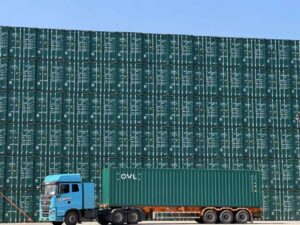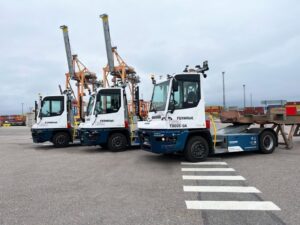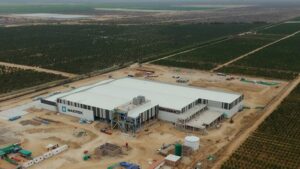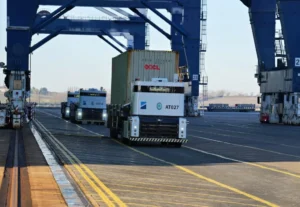The Port of Los Angeles has partnered with the largest port in China to establish the world’s first Transpacific green shipping corridor.
In a project convened by C40 Cities, the Ports of Los Angeles and Shanghai will work with leading industry partners to reduce greenhouse gas emissions from the movement of cargo on one of the world’s busiest container shipping routes.
The newly announced partnership will work towards achieving its core aims by developing a “Green Shipping Corridor Implementation Plan” by the end of 2022, this will include deliverables, milestones, and roles for the partnership.
This plan includes key decarbonisation goals, including:
- The phasing in of low, ultra-low, and zero-carbon fuelled ships through the 2020s, with the world’s first zero-carbon Transpacific container ships introduced by 2030 by qualified and willing shipping lines.
- The development of best management practices to help reduce emissions and improve efficiency for all ships using this international trade corridor.
- Reducing supply chain emissions from port operations, improving air quality in the Ports of Shanghai and Los Angeles and adjacent communities.
The City of Shanghai, the City of Los Angeles, the Port of Shanghai (represented by the Shanghai Municipal Transportation Commission), the Port of Los Angeles, and C40 Cities initiated the coalition.
Participating partners already include the likes of A.P. Moller – Maersk (Maersk), CMA CGM, Shanghai International Ports Group (SIPG), COSCO Shipping Lines, the Aspen Institute’s Shipping Decarbonisation Initiative, facilitators of Cargo Owners for Zero-Emission Vessels (coZEV), and the Maritime Technology Cooperation Centre – Asia.
“International collaboration is essential to decarbonise global supply chains,” said Gene Seroka, Executive Director for the Port of Los Angeles.
“We look forward to partnering with the Shanghai Municipal Transportation Commission, the Shanghai International Port Group, leading shipping lines and major cargo owners to reduce greenhouse gas emissions in the maritime supply chain. It’s time to get started on this important work.”
Mark Watts, Executive Director of C40 Cities, added: “Accelerating efforts to decarbonise the shipping sector is urgent if we are to limit global heating to 1.5 °C. By convening international coalitions of the willing and creating a scalable and replicable model for other cities to follow, we hope this ground-breaking green shipping corridor initiative will catalyse action on a global scale.”
Dan Porterfield, President and CEO of the Aspen Institute, also commented: “The Aspen Institute is proud to support this important international collaboration.
“Through our Shipping Decarbonisation Initiative and in our role as the facilitator of the Cargo Owners for Zero-Emission Vessels initiative, we look forward to working with our partners to help enable the deployment of the first vessels powered by zero life-cycle greenhouse gas emission fuels along this critical shipping route and to making this green corridor project a model of success for the rest of the world.
“It is inspiring that the United States and China have come together in this way to address the climate impact of this crucial global industry.”
The Port of Los Angeles is just one of the ports committed to greener operations and promoting sustainability. This is evidenced in its Clean Air Action Plan, aiming towards operating a zero-emissions fleet by 2030.
“Now it’s time to get after decarbonisation and greenhouse gases,” Seroka stated in the latest instalment of PTI’s ‘In conversation with’ series. “The way to do that is to get to zero emissions.
“In June of 2017, Long Beach Mayor Robert Garcia and Los Angeles Mayor Eric Garett resolved that we would be a zero-emissions terminal port complex by the year 2030 and a zero-emissions heavy-duty truck port by the year 2035 right now on the ground.”








